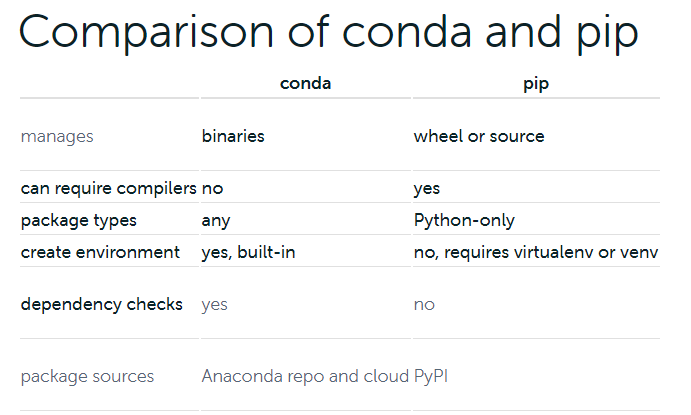

#Conda install package from pip update
!mamba env update -n base -f environment.yml

environment.yml), you can use it like this: !conda env update -n base -f environment.yml Once the installation is done, you can use conda and/or mamba to install the needed packages: !conda install openmm If you want to build your own constructor-based installer, check the FAQ below! It expects a URL pointing to a constructor-like installer, so you can prebuild a Python 3.7 distribution that fulfills your own needs. The Mambaforge distribution is officially provided by conda-forge but I forked and patched it so it's built for Python 3.7.įor advanced users, install_from_url() is also available.
install_mambaforge(): Like Miniforge, but with mamba included. The Miniforge distribution is officially provided by conda-forge but I forked and patched it so it's built for Python 3.7. install_miniforge(): Like Miniconda, but built off conda-forge packages. Unlike Anaconda, this distribution only contains python and conda.  install_miniconda(): This will install the Miniconda 4.9.2 distribution, using a version built for Python 3.7. This contains plenty of data science packages, but they might be outdated by now. install_anaconda(): This will install the Anaconda 2020.02 distribution, the last version that was built for Python 3.7. The default condacolab.install() provides Mambaforge, but there are other conda distributions to choose from: It is important that you perform the installation first thing in the notebook because it will require a kernel restart, thus resetting the variables set up to that point. install ()Īfter the kernel restart, you can optionally add a new cell to check that everything is in place: import condacolab condacolab. On your Colab notebook, run the following code as the first executable cell: ! pip install - q condacolab import condacolab condacolab. Install Conda and friends on Google Colab, easily.
install_miniconda(): This will install the Miniconda 4.9.2 distribution, using a version built for Python 3.7. This contains plenty of data science packages, but they might be outdated by now. install_anaconda(): This will install the Anaconda 2020.02 distribution, the last version that was built for Python 3.7. The default condacolab.install() provides Mambaforge, but there are other conda distributions to choose from: It is important that you perform the installation first thing in the notebook because it will require a kernel restart, thus resetting the variables set up to that point. install ()Īfter the kernel restart, you can optionally add a new cell to check that everything is in place: import condacolab condacolab. On your Colab notebook, run the following code as the first executable cell: ! pip install - q condacolab import condacolab condacolab. Install Conda and friends on Google Colab, easily.







 0 kommentar(er)
0 kommentar(er)
